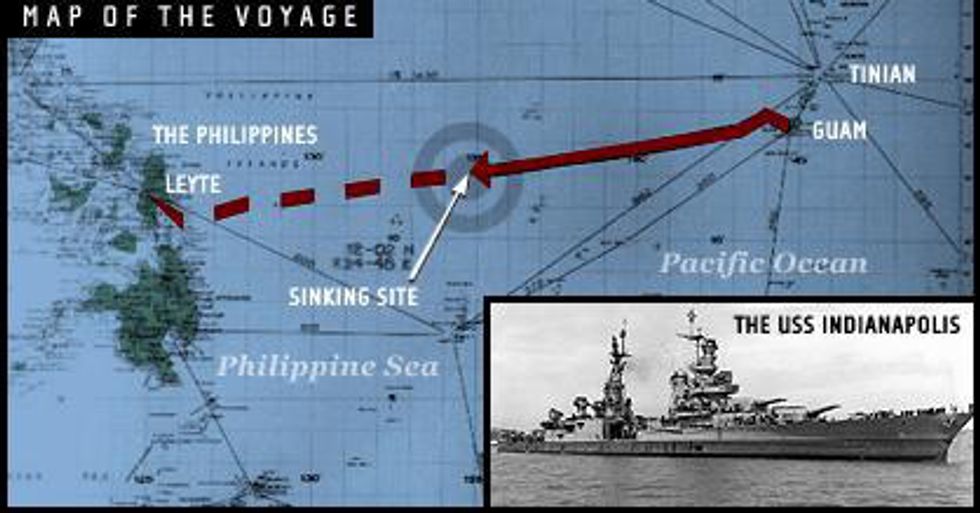On July 26, 1945, the USS Indianapolis set sail to Tinian to deliver the world’s first atomic bomb, which would later be dropped on Hiroshima. Followed by this expedition, the Indianapolis was instructed to join battleship USS Idaho in the Philippines in preparation for the invasion of Japan. On July 30 while sailing towards Leyte, Japanese submarine I-58 fired a series of torpedoes, of which two hit the Indianapolis, and within a quick 12 minutes, she was at the bottom of the sea. That night, 900 Navy officers of the 1,196 aboard made it into the water. The attacks began the next day -- oceanic whitetips had been drawn in by the explosions and started by eating off the dead and the wounded. For four and a half days, they circled the hurdled groups of men. Nine hundred men went into the water, 317 came out.
Oceanic whitetips, also referred to as Carcharhinuslongimanus,are one of the most dangerous species of sharks that can be found in deep, open waters with high temperatures. They typically feed on stingray, sea turtles and bony fish, but have gained a reputation for feasting on survivors of aircraft crashes or shipwrecks.
While oceanic whitetips did feast on survivors of the USS Indianapolis, there is no way to measure how many victims were actually taken by the sharks. The crew of the Indianapolis endured five agonizing days of starvation, dehydration, excessive heat, saltwater poisoning and exposure to their wounds. Therefore, to blame the nearly 600 deaths on sharks is absurd. After a couple of days being stranded in the ocean, survivors became senseless. They would see hallucinations, start fights with others and drink the salt water, driving them to insanity. Because of this, large groups of men split up from each other, becoming more vulnerable to shark attacks. Survivors claim that the lone swimmers were the first ones to get attacked by the sharks.
After four days of being stranded, pilots of the PV-1 Ventura accidentally discovered the survivors and reported "many men in the water." LT. Adrian Marks flew a PBY to the scene, lending assistance and rescuing 56 men that day. Hours later, the USS Cecil Doyle had finally arrived as the first vessel on scene. After four and a half days, a total of 317 men survived the sinking of the USS Indianapolis.
Despite the numerous shark attacks on survivors of the Indianapolis, humans have no reason to fear sharks, rather sharks have reason to fear humans. The reality is that sharks do not like to feed on humans -- that's why so often "shark attacks" are actually a shark bite. A shark bite occurs when the shark either mistakes a human for their usual prey or simply get curious and takes a bite. Once the shark realizes that the human is not its typical meal, it will more often than not, let go of the victim and swim away. Oceanic whitetips are a rare exception to this, as they do feed on survivors of shipwrecks. However, unless you've had to abandon ship, it's likely you will never encounter an oceanic whitetip, as they swim in deep, open waters, away from the beaches that people vacation. In more recent times, it has become even less likely to encounter an oceanic whitetip, as they are now considered a vulnerable species on the verge of extinction. Scientists estimate oceanic whitetips to have declined 70 percent from 1969 to 2003, with their numbers being even fewer today. The fins of oceanic whitetips are considered of high value for the Asian delicacy, shark fin soup. Not only are sharks captured for their fins, but they are often captured only for their fins, brought on board to have them cut off and thrown back into the water, leaving them to drown. This is an old, cruel tradition that needs to be done with.
While it is true that the USS Indianapolis claims history’s largest shark attack incident, the sharks cannot be blamed for all 600 men who were not saved from the water. Exposure took the majority and sharks fed on the wounded, but they were only acting upon their natural instincts. After all, when a shark attack occurs, it is the human who enters the shark’s territory.




















